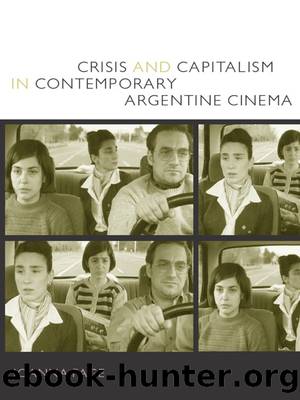Crisis and Capitalism in Contemporary Argentine Cinema by Joanna Page

Author:Joanna Page
Language: eng
Format: epub
Tags: ebook, book
Publisher: Duke University Press
Published: 2011-08-09T16:00:00+00:00
IMAGES OF RURAL ARGENTINA
Alejandro Agresti’s El viento se llevó lo que (1998) explores in a tragicomic vein the experience of life at the periphery of modernity, in a small town in Patagonia during the 1970s. Everything arrives late to Río Pico, including film reels (worn out, badly mended, and with sections missing after their passage through the cultural centers of the country), major inventions and theories of the twentieth century, and even news of the dictatorship. But Agresti’s vision is essentially nostalgic, one in which a sense of genuine community is associated with an earlier, purer era: once television arrives in the town and the cinema falls into disuse, such social ties are atomized. There is no reason for the protagonist to stay, as “un pueblo con televisión se parece a cualquier pueblo” (one town with television is like any other town).
Other recent films have depicted the rural in rather more ambivalent terms that complicate the center-periphery model underpinning Agresti’s film. The anticapitalist impetus of many films has certainly produced nostalgic images of a rural, lesser-developed Argentina, in which the country has retained a community spirit now unattainable in the city, where everything has been subsumed into economic relations. However, the overlaying of different imaginaries—such as European romanticism, the dichotomy between civilization and barbarism as traced by Sarmiento and then reformulated by other Argentine thinkers, together with neoliberal ideas of progress—has produced contradictory images of the country, in which it appears as authentic and the place of self-discovery but also as the site of barbarism, raped by industrialization but also as an economic resource for new forms of revenue, such as tourism. As I will show, the superimposition of two or more of these discourses creates complex images; in contrast to the rural cinema popular during the first couple of decades of the twentieth century in Argentina, a period of intense modernization and expansion in which the rural is often constructed as reassuringly “other” to the city, undisturbed by the upheavals of modernization,9 recent cinema more often depicts a countryside significantly impacted by neoliberal and globalizing economic forces. A revived cinematic interest in the landscapes and societies of rural Argentina also reflects a broader, discursive repositioning of Argentine national identity in closer relation to regional underdevelopment than to European cosmopolitanism, as a result of the experience of the Crisis. Mario Rapoport gives as one of his recommendations for foreign policy following the Crisis “volver a instalar a la Argentina en su ámbito geográfico natural, América Latina, intensificando los intercambios, estableciendo políticas comunes con nuestros vecinos frente al resto del mundo, tanto en el terreno económico como en el político y estratégico, y afianzando la identidad regional” (to reestablish Argentina in her natural geographical sphere, Latin America, strengthening exchanges, forging common policies with our neighbors with respect to the rest of the world, in the field of economics as well as of politics and strategy, and consolidating regional identity).10 What is shared among most films located in the “interior,” and particularly
Download
This site does not store any files on its server. We only index and link to content provided by other sites. Please contact the content providers to delete copyright contents if any and email us, we'll remove relevant links or contents immediately.
Call Me by Your Name by André Aciman(20517)
Ready Player One by Cline Ernest(14675)
How to Be a Bawse: A Guide to Conquering Life by Lilly Singh(7486)
Wiseguy by Nicholas Pileggi(5786)
The Kite Runner by Khaled Hosseini(5180)
On Writing A Memoir of the Craft by Stephen King(4944)
Audition by Ryu Murakami(4930)
The Crown by Robert Lacey(4817)
Call me by your name by Andre Aciman(4684)
Gerald's Game by Stephen King(4654)
Harry Potter and the Cursed Child: The Journey by Harry Potter Theatrical Productions(4507)
Dialogue by Robert McKee(4405)
The Perils of Being Moderately Famous by Soha Ali Khan(4220)
Dynamic Alignment Through Imagery by Eric Franklin(4217)
Apollo 8 by Jeffrey Kluger(3709)
The Inner Game of Tennis by W. Timothy Gallwey(3687)
Seriously... I'm Kidding by Ellen DeGeneres(3634)
How to be Champion: My Autobiography by Sarah Millican(3593)
Darker by E L James(3516)
